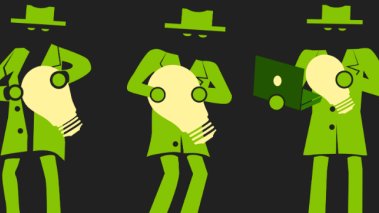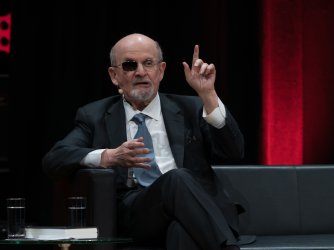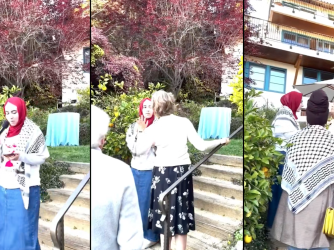Table of Contents
Monopolizing the Marketplace of Ideas

The point of defending free speech is ensuring that the minority has the right to express their views without being silenced by the majority. This principle of allowing unpopular opinions to be voiced is upheld when groups stage protests, but the right to free speech does not extend to protests that prevent discourse.
Protests are protected under the First Amendment, and they can be a beneficial part of discussions on hot button issues. The most effective way to combat speech one deems to be bad or offensive is to counter it with more speech. This creates the marketplace of ideas, where opinions and views are freely exchanged. The added speech can be effective in highlighting points of disagreement or adding nuance to a complicated discussion. By voicing a dissenting opinion, protests offer listeners the chance to hear all sides of an issue. This is particularly valuable on college campuses where students are shaping their beliefs as they prepare for life after graduation. Through listening to all views on an issue, each individual can come to a reasoned conclusion on their own.
While protesters create conversation, they step into dangerous territory when they move from merely disagreeing with their opponents to shutting them down outright—in other words, when they invoke the heckler’s veto. The heckler’s veto is when a group of people find speech so objectionable that they think it shouldn’t even be heard, and they take steps to ensure no one else hears it. Through shouting down speakers or petitions to cancel lectures, the heckler’s veto shuts down speech and robust discussion along with it.
I witnessed the heckler’s veto in person when I attempted to attend a lecture held at Brown University, featuring former NYPD Commissioner Ray Kelly. Kelly was scheduled to discuss the efficacy of stop-and-frisk policies at reducing crime in New York City. In the days leading up to the lecture, there were petitions to disinvite Kelly and posters advertising the event were vandalized. On the day of the lecture, there was a protest staged outside the building where Commissioner Kelly would be speaking.
Unfortunately, the protest didn’t stop there. Protesters who found the stop-and-frisk policies offensive—to the degree that they were unfit to even be discussed—interrupted the lecture from within the auditorium. Standing up and disrupting Commissioner Kelly to the point that he was unable to speak, hecklers prevented any conversation about the stop-and-frisk policies from taking place.
In the wake of the incident, Brown updated their Protest and Demonstration Guidelines, which state:
Protest is a necessary and acceptable means of expression within the Brown community. However, protest becomes unacceptable when it obstructs the basic exchange of ideas. Such obstruction is a form of censorship, no matter who initiates it or for what reasons.
The guidelines highlight the fact that part of freedom of expression is the ability to have a thriving marketplace of ideas. The issue with hecklers shutting down speakers stems from the misconception that the hecklers may act as the sole arbiters of what speech is fit for consumption by the entire community. Just because one group of people finds an idea objectionable does not make it objectively so. Further, even if an idea is objectively offensive, that doesn’t preclude it from the conversation on campus. By deeming speech unfit for everyone else’s ears, hecklers are trying to create an absolute truth as to what is or isn’t acceptable speech. However, by determining what can or can’t be heard by the larger community, hecklers who shut down speech take away the autonomy of everyone else to make their own reasoned decisions. The rest of the community is deprived of the opportunity to listen to all arguments in a debate and come to their own conclusions; instead, someone else’s idea of truth is forced upon them.
The heckler’s veto on campuses also undermines the questioning process we want college students to experience. Society should hope that colleges are graduating students who challenge preconceived notions instead of blindly accepting truths. College provides students with the opportunity to expose themselves to a variety of viewpoints, but in order to do so, students have to be able to listen to those viewpoints.
In the case of the Ray Kelly protests, I went to the lecture not particularly informed about the stop-and-frisk policies. I knew they were accused of being akin to racial profiling, so I wanted to hear them defended by the person who implemented them. Who knows how I would have left the lecture feeling? I might have found Kelly’s argument compelling and agreed that stop-and-frisk policies are an effective means of reducing crime. On the other hand, I could have left realizing that they’re indefensible racist policies. But because the hecklers prevented any conversation, I didn’t learn the answer to that question at the event, and neither did anyone else who attended.
There is a sense of entitlement hecklers have, in that they place themselves on a moral high ground. Instead of realizing they’re undermining the principle of freedom of expression, hecklers feel like crusaders; protecting the community from scary ideas. However, hecklers aren’t using their free speech when they shut down other speakers, they are acting as censors on campus conversations. They see themselves as having the ability to determine what can and can’t be said on a campus, undermining the freedom of expression along the way. The basic principle that allows protesters to speak their mind does not justify them in taking that same right away from others, no matter how objectionable they find dissenting views. As Brown’s guidelines state, “By asserting their rights to protest, individuals cannot decide for the entire community which ideas will or will not receive free expression.” A vocal minority shouldn’t control the conversation for an entire community, nor can they decide when or where free speech applies.
Dani Dichter is a FIRE summer intern.
Recent Articles
FIRE’s award-winning Newsdesk covers the free speech news you need to stay informed.

Salman Rushdie calls out left-wing censorship in CBS interview

Western Washington University punishes racing team for sending a photo of a penis drawing on a pizza box

No, the Berkeley Law student didn’t have a First Amendment right to interrupt the dean’s backyard party
